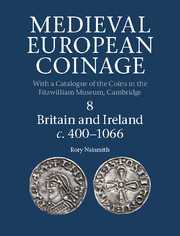Book contents
- Frontmatter
- Contents
- List of plates
- List of figures
- List of maps
- List of tables
- Preface
- Note on spelling
- List of abbreviations
- 1 Introduction
- 2 From Roman Britain To Anglo-Saxon England
- 3 Early Anglo-Saxon Gold Coinage
- 4 The Early Silver Pennies
- 5 The Kingdom Of Northumbria
- 6 The ‘Mercian Supremacy’ In The Age Of Offa And Coenwulf
- 7 The Rise Of Wessex In Southern England
- 8 The Reign Of Alfred The Great
- 9 England From Edward The Elder To Edgar's Reform
- 10 The Late Anglo-Saxon Coinage
- 11 The Anglo-Viking Coinages
- 12 Wales And Scotland
- 13 The Isle Of Man And ‘Irish Sea’ Coinages
- 14 Ireland To 1170 (with Andrew Woods)
- APPENDICES
- Bibliography
- CATALOGUE
- Concordances
- Indexes
2 - From Roman Britain To Anglo-Saxon England
Published online by Cambridge University Press: 11 May 2017
- Frontmatter
- Contents
- List of plates
- List of figures
- List of maps
- List of tables
- Preface
- Note on spelling
- List of abbreviations
- 1 Introduction
- 2 From Roman Britain To Anglo-Saxon England
- 3 Early Anglo-Saxon Gold Coinage
- 4 The Early Silver Pennies
- 5 The Kingdom Of Northumbria
- 6 The ‘Mercian Supremacy’ In The Age Of Offa And Coenwulf
- 7 The Rise Of Wessex In Southern England
- 8 The Reign Of Alfred The Great
- 9 England From Edward The Elder To Edgar's Reform
- 10 The Late Anglo-Saxon Coinage
- 11 The Anglo-Viking Coinages
- 12 Wales And Scotland
- 13 The Isle Of Man And ‘Irish Sea’ Coinages
- 14 Ireland To 1170 (with Andrew Woods)
- APPENDICES
- Bibliography
- CATALOGUE
- Concordances
- Indexes
Summary
HISTORICAL INTRODUCTION
The history of Britain in the fifth and sixth centuries is notoriously obscure, yet at the same time proved transformational, as the burgeoning secondary literature relative to the limited range of written source material emphasises (accessible recent surveys include Heather 2009, 266–305; Gerrard 2013; Halsall 2013). During this period the Roman diocese of Britain metamorphosed into a patchwork of smaller kingdoms; those in the east gave rise to Anglo-Saxon kingdoms, those in the west to British. Texts bearing on this process are scarce, especially from Britain itself. Archaeology, language and epigraphic evidence therefore play a prominent role. Collectively, these sources tell a story of changes just as far-reaching as those presented in the origin legends which were the most prominent historiographical legacy of the period. The fifth and sixth centuries saw significant simplification in living standards for most segments of society, as well as a fragmentation of political structures. They also, however, saw preservation of a dynamic Roman-influenced Christian culture in the west, and the emergence of complex new social and cultural identities across Britain.
In the fourth century Britain was still very much a part of the Roman world. It was a diocese within the prefecture of Gaul, and consisted of four (or possibly five) provinces with their capitals at Cirencester, Lincoln, London and York. The land was divided into a series of civitas territories, each with an urban centre, following the territorial organisation found throughout the Roman world (Jones and Mattingly 1990, 148, 154). Britain's elite lived in elegant and well-appointed villas which reflected wealth and refinement, and participation in empire-wide traditions of literature, religion and display of status (Gerrard 2013, 118–55). Those whose labour supported the town and villa dwellers were not always as integrated into the Mediterranean-patterned Roman state infrastructure, though the stability of Roman rule fostered the development of production and exchange in bulk, and the benefits of this reached down to all levels of society: many inhabitants of southern Britain in the fourth century used Gallic pottery for even their day-to-day needs (Ward- Perkins 2005, 97–100).
- Type
- Chapter
- Information
- Medieval European Coinage , pp. 23 - 38Publisher: Cambridge University PressPrint publication year: 2017



